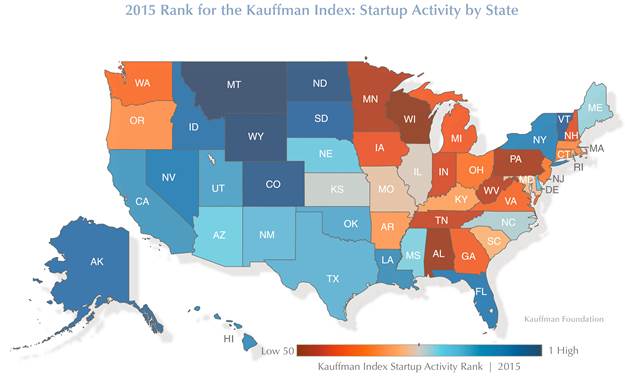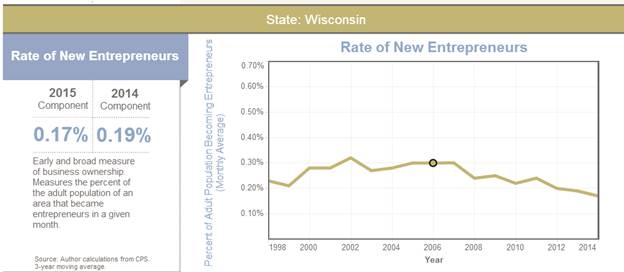From the Wisconsin Economic Development Corporation (WEDC) website:
We’ve [WEDC] put a greater focus on supporting high-growth entrepreneurs in Wisconsin. The Seed Accelerator program is supporting veterans, inner city Milwaukee and water technology businesses; and helping entrepreneurs get their ideas off the ground. …
The Kauffman Foundation’s most recent assessment indicates that progress on the entrepreneurship front is not in line with expectations: in 2015 it ranks Wisconsin at 50 (out of 50 states), falling five slots since the 2014 rankings. Here is a graphical depiction:

Source: Kauffman Foundation, State and Metro Trends.
I don’t take the decline in the rankings from 45th to 50th too seriously — in general rankings are not the ideal way to characterize relative performance. However, the fact that Wisconsin remains two consecutive years in the bottom quintile is suggestive that — at least according the Kauffman metrics — Wisconsin has not enjoyed a renaissance in entrepreneurship in recent years.
Here is a time series of one of the components, the rate of new entrepreneurs:
Source: Kauffman Foundation.
Notice that this series has been declining since 2011. The opportunity share is lower than 2011, while opportunity density (2012) is essentially flat.
In some ways, this outcome is unsurprising. The agency tasked to improve the entrepreneurial environment — WEDC — is Governor Walker’s flagship innovation to privatize the former Commerce Department. It has received criticism in recent months after writing off a $500,000 loan to a company that was a substantial contributor to Governor Walker’s political campaigns [1], in addition to a long string of bureaucratic problems, as outlined in the Legislative Audit Bureau [2] (Interestingly, two Republican assemblymen have just proposed eliminating the Legislative Audit Bureau [3]).
As an aside, the ALEC-Laffer document Rich States, Poor States 2015 ranks Wisconsin at 13th, rising from its 2011 ranking at 30th (2011 rank pertains to 2010 data). Hence, Wisconsin’s rate of new entrepreneurs seems to be inversely correlated with how highly ranked Wisconsin is, according to RSPS.

Right, just keeping documenting the pain versus the gain, and again we see little gain as John Galt never came back to WI after Walker’s austerity. Can I request similar posts on the pain inflicted by Walker’s austerity, such as comparing child poverty in WI, KS, MN, CA and USA since 2011 etc.?
So if you want to go to a hot state for a start-up, it’s Montana, Wyoming, North and South Dakota and Alaska. And let’s not forget Idaho.
And Vermont. Not sure what they’re doing up there (except escaping Massachusetts taxes), but whatever it is, it seems to be working.
One start up in an “empty state” could put them in the first rank.
I guess that was my point. It’s quite difficult to interpret the list. The rankings are both non-obvious and highly volatile. I think NJ moved up something like 17 spots in a year. I’m not sure much has changed here over that period.
By the way, I think the two states we should use as metrics are Nebraska and Vermont.
If you look at the various lists, these two keep popping up. Nebraska has the second lowest unemployment rate after N. Dakota. Given that Nebraska is not a notable energy producer, that seems like a big achievement. How do they do it?
Vermont also keeps showing up. I have no idea what they are doing up there, but they seem pretty consistently successful.
So, fine, let’s keep talking Midwest. But if I were looking to two states which seem to set the high bar, it’s Nebraska and Vermont.
Lincoln has always had a fair number of ag-related start-ups. Omaha has put considerable effort into attracting young people regionally who have an idea but aren’t willing to make the cultural jump to California or Massachusetts. (Not cultural in the “culture wars” sense, just that the differences in pace and behavioral expectations on the coasts can be really grating to someone from the Midwest.) Basically, they’ve identified a niche of sorts where they can compete successfully against the big coastal players.
Wait! Minnesota dropped from 44th to 47th. How is that possible??? Not Min-ne-so-ta! Olaf is going to be very displeased.
The Rich States Poor States report ranks Wisconsin 11th (table 1) based on the author’s pre-suppositions on current policy. However, when looking at recent history, it ranks Wisconsin 34th (Table 2).
Gridlock: Looking at RSPS 2015 (8th edition), I see Wisconsin at 13 for outlook, and 43 for performance.
Dear Menzie,
To put it mildly, I am not a fan of governor Walker’s. But I would just be curious to know how the Kauffman Foundation rankings by state correlate with research spending by universities and colleges in the state. If there are no new ideas, there may be no new entrepreneurs even if the state has negative taxes on entrepreneurs, which still won’t pay for overcoming infrastructure problems, and a lack of an educated workforce.
Guys, the government does not create entrepreneurs; it only prevents entrepreneurs choosing their jurisdictions. Walker is showing his government side when he tries to use government to create entrepreneurs. The way you attract entrepreneurs is to remove wedges from businesses developing their production so that the entrepreneur can create rather than politic.
As an aside, I am always amused when I see commercials from New York trying to bring business into the state. They spend the entire commercial trying to convince businessmen that they will receive tax breaks if they move to New York. I am sure that the businesses that are already in New York are really pleased by that. Cuomo might want to make the whole business environment friendly rather than attempting to bribe businesses for 10 years.
” the government does not create entrepreneurs; it only prevents entrepreneurs choosing their jurisdictions. ”
many of the startups we want are technology driven, advanced manufacturing, IT, etc. this requires an educated workforce, and an incubator for ideas. government can play an effective role in both areas through university and technology parks. it still requires private enterprise to provide capital funding for the entrepreneur, but ideas and places to start can be handled well by government programs.
Every state is different.
Paper mills and cheese factories may not attract much talent, from the rest of the country and the world.
And, “Rust Belt” states had a smaller role in the Information Revolution than “Sun Belt” states.
Yet, many, if not most, states had a decline in “start-up density” from 2006-10, and then it roughly flattened out, since 2010, including Wisconsin.
http://www.kauffman.org/microsites/kauffman-index/profiles/state?State=Wisconsin
Peak,
Your observation is very important and is broader than just for states. The number of IPOs in the US had declined significantly. Technology and entrepreneurs are being driven out of the US. Where we were once the technological innovators, more and more we are the providing innovators to the rest of the world. IPO creation</a< has been stagnant since early 2000.
Ricardo, perhaps, after the recession, it became harder to get a loan, and even more costly and risky to start a business (e.g. because of more regulations, more progressive taxes, and slower demand).
Fred DeLuca, who founded Subway in the mid-1960s, on starting a business today:
“I don’t think I would have been able to get through the maze that we have today. As a seventeen year old–a seventeen year-old with very little money–I would have been blocked. I’m pretty confident that the lag time to get open, the amount of costs to meet regulations, the rent I would have had to pay while I was burning up time…those things would have put me out of business.”
Wisconsin is a example of the popular saying “the states are the meth laboratories of democracy.”